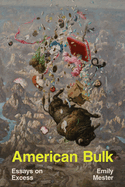
American consumers have been a subject of public scorn, political courtship, market analysis, and journalistic investigation. As a faceless demographic, their habits have seemed to mystify, and even disgust, those who study their preferences, their predictability, their pathology. But in American Bulk: Essays on Excess, Emily Mester takes a more compassionate route through the labyrinth of brand-name overabundance and the pantheon of casual dining chains.
Throughout these 10 inquisitive and deeply observed pieces, Mester is frank about the privilege that raised her. Her parents and her grandparents built significant wealth through dedication and hard work, raising a banner of money over her that distorted her sense of need. In a trilogy of essays about her grandmother's home in Storm Lake, Iowa, Mester ruminates poignantly on the animosity between her lavish spender of a father and his frugal and hoarding mother, who battle like the lost souls in Dante's circle of hell dedicated to the greedy: "They think that they clash because they're opposites. But the impulses that drive them are exactly the same." Nonetheless, a product of her upbringing like many Americans, Mester's gaze through the glass seems preoccupied with neither extravagance nor miserliness, but the very impulse itself to consume. "It wasn't the things that I loved so much as the transaction, the beep of the buttons, the receipt paper smooth between my thumb and forefinger."
From this vantage, American Bulk presents an affable and humble study of the senses that consumption can satisfy and the ones it can't. In a late-stage capitalism heaving with choice, Mester assumes the role of a millennial Virgil with both style and grace. --Dave Wheeler, senior editor, Shelf Awareness

